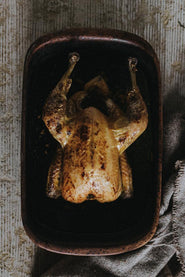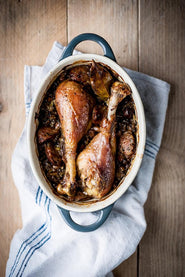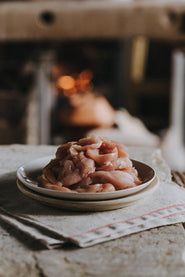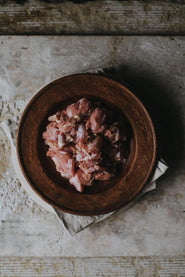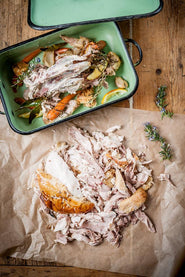Chicken is by far one of Britain’s favourite foods, accounting for half of our meat consumption. One of the reasons chicken has become the nations favourite meat, is it is incredibly cheap to buy. Today, you can find a whole chicken on the supermarket shelves for just £2.89.
As we face a climate crisis with growing momentum towards sustainable living, food waste is four-square on the agenda around the globe, yet even with this appetite for change, we are wasting more than ever and this includes chickens.
Waste and Resources Action Programme (WRAP) estimates that Britons waste a staggering 86 million chickens a year, costing the country £12.5bn.
When you consider that a supermarket chicken costs less than a pint in your local pub, it's no wonder many people do not bat an eyelid if they throw out something perceived to have such little value.
Over the years we have become more and more distant from the process of getting food from field to fork and often accept cheap chicken as a good deal, however its low cost comes at a high-price for both the birds and for our health.
90% of UK poultry is reared in intensive conditions, and the number of higher-welfare chickens in the UK is at its lowest in a decade.
57% of chickens reared in industrial systems are reported to have severe walking difficulties.
Two-thirds of chicken meat in the UK is contaminated with a bacteria called campylobacter, which is responsible for over 280,000 cases of food poisoning each year and an estimated 100 deaths. This costs our NHS a whopping 900 million pounds a year to treat, a huge deficit in the already stretched budget.
24% of UK supermarket chicken samples tested positive for antibiotic resistant E-coli.
None of this accounts for the cost to the environment; from eye-watering electricity usage to keep the 24 hour heated and brightly lit sheds running, to the poisonous effluent water run off these plants emit every single day.
There are just a handful of companies who control the many industrial farms around the world, including those in the UK. These chicken farms are so inhumane, there’s not really anything even a good farmer can do to improve conditions because it’s so tightly controlled by these corporations who are solely focussed on efficiency and profit - at all costs.
Industrial Chicken, Rotten to the Core
We have first hand experience of the horrors of industrial farming. It was this direct experience that led us to found our company.
Since then sheds have become even bigger, now holding in excess of 100,000 birds at a time. The chicks grow even faster, with a hellish lifespan of just 28 days, compared to that of free range bird at 56, an organic bird at 70 days and a chicken at 84 days.

You'd Never Throw Our Chicken Away
Our chickens are grown slowly to reach natural maturity. Our Properly Free Range chickens are slow-grown in small groups, free to roam outside on healthy hillside pastures in natural light, and with the freedom to display their natural instincts such as scratching for food and dust bathing. These contented birds have properly developed bones and muscles and a strong natural immunity from scratching and pecking in the soil.
All our free range chickens are raised amongst lush pasture, which not only provides our birds with a wonderful healthy environment to explore, the pasture also makes up a proportion of our chicken's diet.
We want our birds to live a proper life, scratching and dust-bathing, foraging and flapping. This active life not only is vitally important from our ethical viewpoint, but also ensures our birds develop a proper carcass and muscles which results in healthy, nutritious food.
Our Properly Free Range Chickens are healthy, nutritious food, grown without the need for any routine use of antibiotics, and not exposed to the significant problems of food poisoning bacteria associated with industrial-scale systems of farming and processing.
We believe in better farming, with a 360° respect for the environment, farmer, animals and you, the customer.
More and more so food is being viewed as a commodity, not something that should be enjoyed and savoured. This has resulted in the scary increase of food waste.
The biggest barrier for consumers is that higher-welfare chicken is around four times more expensive than the cheapest chickens.
We encourage you to change your view of the nations favourite meat. Say no to industrial chicken and instead adopt a 'less and better' approach. Enjoy chickens less often, but when you do choose the best quality, do not simply accept the hidden costs of industrial food.
Use the whole bird and do not throw any of it away. Cook a nourishing stock from the carcass, and eat the offal that comes with our Properly Free Range chickens in the form of giblets. Use up your leftovers and respect the life of the bird.
Join us in demanding #betterchicken.
You can find our full range of sustainably reared Properly Free Range Chicken here.

